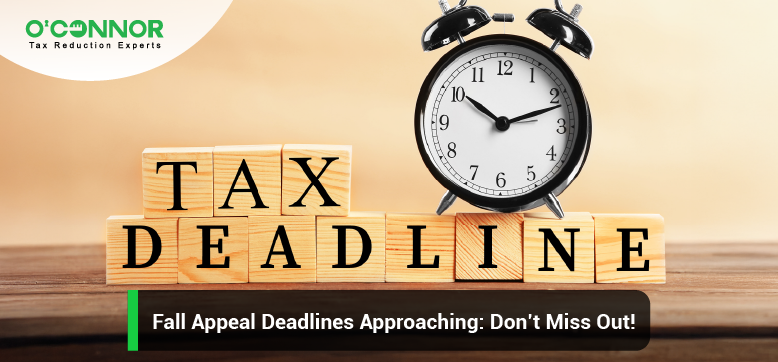
In Illinois, appeal deadlines are approaching fast. Specifically in Cook, DuPage, Kane, Lake, McHenry, and Will counties, where O’Connor advises on and analyzes residential property tax protests, many appeal deadlines have already been announced for September. For Cook County, there are two deadlines, the Assessor deadline and the Board of Review (BOR) deadline. Outside of Cook County, there is only the BOR deadline, meaning it is the only opportunity to appeal for the current year. Illinois is consistently ranked among states with the highest property taxes in the nation; no doubt thousands of homeowners are paying more than their fair share. It is important to take advantage of appealing for a chance at a reduction before the deadline for your township has passed.
For properties in Cook County, you may appeal first at the Assessor level, but if you are not successful at appeals, then it is important to take advantage of the opportunity to protest with the BOR. For properties outside of Cook County, if the property is appealed at the BOR level and if the reduction is not satisfactory, O’Connor can help coordinate an appeal to the Illinois Property Tax Appeal Board (PTAB).
County Deadlines
The table below shows upcoming deadlines for each township and its county.
| County | Townships | Assessor Deadline | BOR Deadline |
|---|---|---|---|
| Cook | Bremen | Passed | |
| Cook | Calumet | 9/11/2025 | |
| Cook | Elk Grove | Passed | 9/16/2025 |
| Cook | Hyde Park | 9/16/2025 | |
| Cook | Lake View | Passed | 9/16/2025 |
| Cook | Lemont | 9/2/2025 | |
| Cook | Leyden | 9/2/2025 | |
| Cook | Lyons | Passed | 9/16/2025 |
| Cook | New Trier | Passed | 9/16/2025 |
| Cook | Wheeling | 9/30/2025 | |
| Cook | Worth | 9/23/2025 | |
| DuPage | Downers Grove | 9/15/2025 | |
| Kane | Virgil | 9/8/2025 | |
| Kane | Hampshire | 9/8/2025 | |
| Kane | Blackberry | 9/2/2025 | |
| Lake | Cuba | 9/22/2025 | |
| Lake | Wauconda | 9/2/2025 | |
| Lake | Benton | 9/8/2025 | |
| Lake | Avon | 9/22/2025 | |
| Lake | Waukegan | 9/2/2025 | |
| Lake | Vernon | 9/8/2025 | |
| Lake | Libertyville | 9/29/2025 | |
| Lake | Warren | 10/6/2025 | |
| Lake | Antioch | 9/29/2025 | |
| Lake | Ela | 9/22/2025 | |
| Lake | Grant | 9/15/2025 | |
| Lake | Moraine | 9/15/2025 | |
| Lake | Newport | 9/15/2025 | |
| McHenry | Hartland | 9/12/2025 | |
| McHenry | Greenwood | 9/19/2025 | |
| McHenry | Coral | 9/15/2025 | |
| McHenry | Nunda | 9/2/2025 | |
| Will | Channahon | 9/8/2025 | |
| Will | Crete | 9/8/2025 | |
| Will | Custer | 9/8/2025 | |
| Will | DuPage | 9/8/2025 | |
| Will | Florence | 9/8/2025 | |
| Will | Frankfort | 9/8/2025 | |
| Will | Green Garden | 9/8/2025 | |
| Will | Homer | 9/8/2025 | |
| Will | Jackson | 9/8/2025 | |
| Will | Joliet | 9/8/2025 | |
| Will | Lockport | 9/8/2025 | |
| Will | Manhattan | 9/8/2025 | |
| Will | Monee | 9/8/2025 | |
| Will | New Lenox | 9/8/2025 | |
| Will | Peotone | 9/8/2025 | |
| Will | Plainfield | 9/8/2025 | |
| Will | Reed | 9/8/2025 | |
| Will | Troy | 9/8/2025 | |
| Will | Washington | 9/8/2025 | |
| Will | Wesley | 9/8/2025 | |
| Will | Wheatland | 9/8/2025 | |
| Will | Will | 9/8/2025 | |
| Will | Wilmington | 9/8/2025 | |
| Will | Wilton | 9/8/2025 |
Importance of Appealing and Benefits
Filing an appeal to challenge property taxes could lead to many benefits for home and business owners in Illinois. Other than the potential to lower your tax bill and receive great tax relief, some of the benefits of appealing include:
- Offsetting high tax rates
Illinois has some of the highest taxes in the U.S.; therefore, a reduction in assessed value could make a big difference in the annual tax bills compared to other states in the nation.
- Fair taxation
Appealing taxes could lead to homeowners paying just the right amount, as opposed to paying more than their fair share and shouldering a greater tax burden.
- Helps address inequities and errors
In recent years, data in Illinois (particularly in Cook County) has shown that the property tax system can disproportionally over-assess lower- and middle-class homes. By appealing, homeowners can ensure fair taxation and challenge systematic errors.
- Compounds over time
A successful property tax appeal can save residents more money than just the first year. By lowering the assessment, it establishes a fair market value, which can then be moved forward over the years. This acts as a base from which other appeals can be launched, maybe even mitigating some or all of the raises associated with a reassessment.
- Your taxes cannot be raised by unsuccessful appeals
One last important benefit to appealing the tax assessment is that there is no penalty for trying. Filing an appeal is no-risk and if your appeal is denied, the tax bill won’t increase and will remain at the current assessment. Many Illinois property owners don’t apply, but should, because of the chance of great rewards. Some residents avoid appeals due to misconceptions and the process can feel overwhelming.
How the Appeals Process Works

There are a lot of misconceptions about the appeals process. Property owners may not realize how simple and low-risk the process actually is.
Step 1. Review your property record card and discuss potential errors with your assessor.
Step 2. File a formal appeal by submitting a written complaint using form PTAX-230 to your county’s BOR.
Step 3. Appeal further if your reduction is unsatisfactory or if BOR denies your appeal by continuing to the PTAB in Springfield.
It is important that property owners pay attention to deadlines. Depending on your county, appeals must be submitted within 30 business days of the assessment notice mailing or live publication.
How Can O’Connor Help
If the property is appealed at the BOR level and the reduction is not satisfactory, O’Connor can help advance the case to the PTAB by engaging with attorneys that handle appeal or by coordinating with your current legal team or lawyer. O’Connor has over 50 years of experience in providing valuation analysis, gathering evidence, and collaborating with attorneys. We have a branch office in the Chicago area, giving us a local presence. Our property tax experts are well equipped and knowledgeable of how to help our clients and their lawyers achieve the best reduction . Sign up with O’Connor today and only pay if your taxes are lowered.

